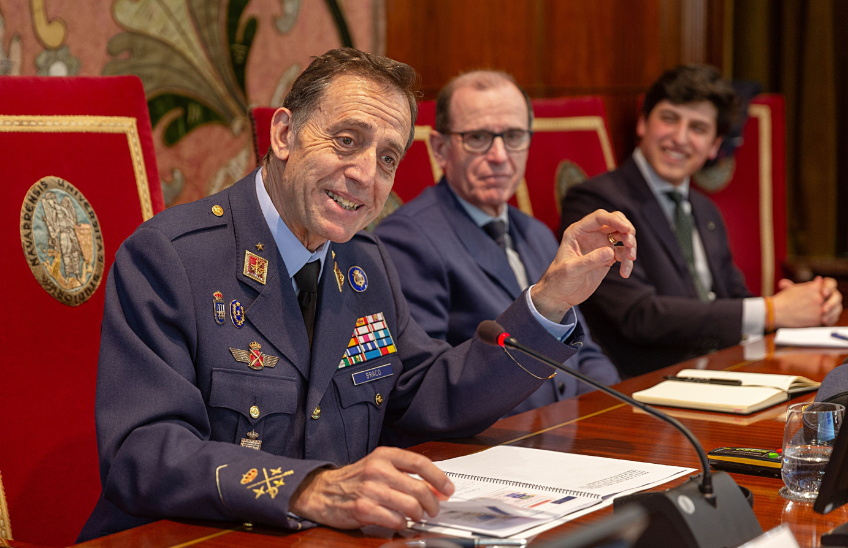Spain has nearly 3,000 soldiers deployed in 17 military operations abroad.
The Commander of the Operations Command, Lieutenant General Francisco Braco Carbó, gave a session at the University of Navarra.

FotoManuelCastells/Lieutenant General Francisco Braco accompanied by Professor Salvador Sánchez Tapia and the president of the University's Security and Defense Club, Jairo Ciscar.
19 | 02 | 2024
Spain currently has around 3,000 soldiers deployed in 17 operations abroad, either with the United Nations, under NATO command or in collaboration with other countries. How are these missions organized? How does the Operations Command work? The commander of the Operations Command, Lieutenant General Francisco Braco Carbó visited the University of Navarra to answer these and other questions during the session he held with students, invited by the Security and Defense Club of the School Law School.
Accompanied by Associate Dean of Students, Professor Xabier Basozábal, and Salvador Sánchez Tapia, professor of International Relations, Lieutenant General Francisco Braco referred to several missions that the Spanish troops carry out, from Spain, such as the work developed in support of Ukraine with the training of Ukrainian military; or abroad, such as the protection of ships carrying humanitarian financial aid from pirate attacks in the Indian Ocean or the presence of the Spanish Armed Forces in Lebanon protecting the stability of the so-called Blue Line or Lebanese border, among others.
The high command explained to the students the functions of the Operations Command, a body that acts as link between international operations and the Government of Spain. "The level of the Operations Command is joint, that is to say, it encompasses all the land, sea and air armies, a total of 200 military personnel including NCOs and troops. Each army brings its point of view to the organization of the operation, which is enriching," said the lieutenant general. He also added that each army is manager of the preparation of its troops.
As he explained, the Spanish intervention in military operations abroad follows a chain of command that goes from the President of the Government, Minister of Defense, Jemad up to the Operations Command, which is the manager to present the military response options, the capabilities and the necessary contingent (issue of troops, ships, planes, etc) to carry out the mission statement; it also has to evaluate which are the rules of engagement, that is to say, which rules must be followed by the military that are going to participate in this defense. Furthermore, prior to a foreign intervention, the Government must gather information and obtain the authorization of the congress de los Diputados.
"The role of the Operations Command is similar to that of an orchestra director in charge of guiding its musicians, in this case, the chiefs of the land, sea and air armies, in organizing a mission statement", indicated Lt. Gen. Braco.
The lieutenant general explained the different types of operations depending on whether they are aimed at deterrence and defense; the maintenance of peace and stability in a given region and other contributions unrelated to the above, and highlighted the 3,000 military personnel from all the armies who are on duty every day to attend to the needs that may arise.
As explained by Braco, military operations abroad must comply with one of the following assumptions: that a country and/or the United Nations, NATO, the EU, etc., require support for defensive, humanitarian or stabilization and peacekeeping purposes in accordance with the UN Charter and international law.
